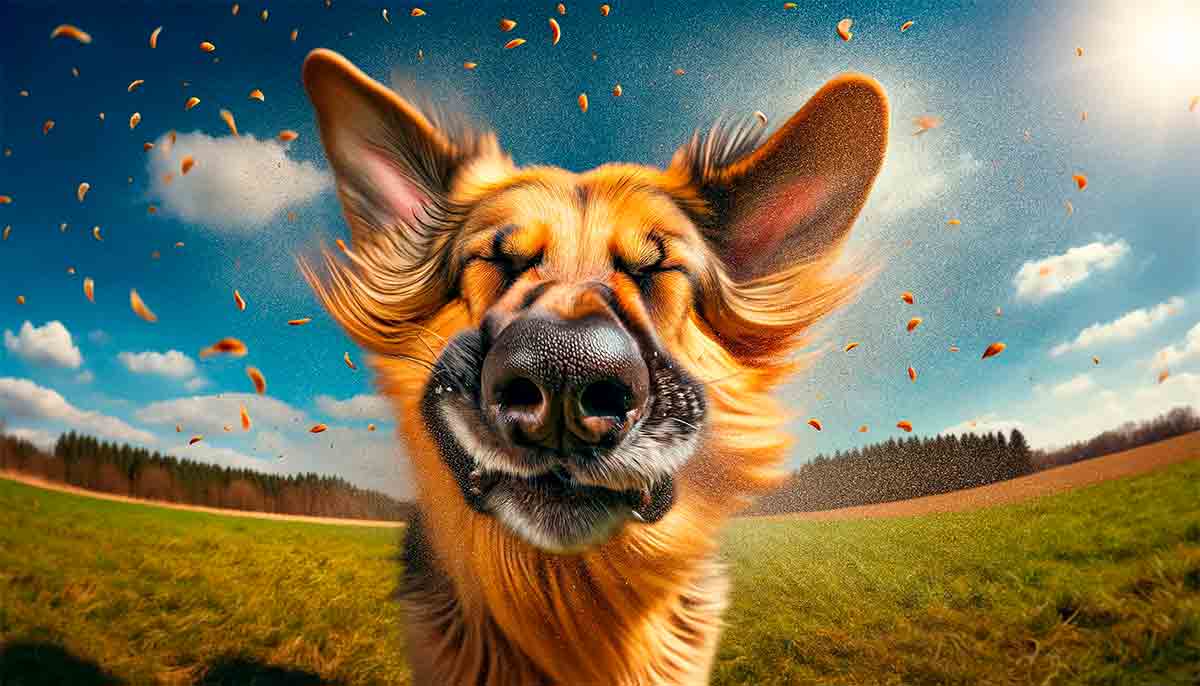
Do your dogs sneeze a lot? Why does this happen? According to experts, most of the time, sneezing is not a cause for concern, but it can also indicate that your dog is facing some more serious respiratory issues.
Common Causes of Sneezing in Dogs
If your dog sneezes and has nasal swelling, persistent runny nose or nasal bleeding, or is pawing at the nose, there is likely an underlying reason. Don’t hesitate to contact your veterinarian for a professional evaluation.
Check out 8 possible causes that explain why your dogs sneeze:
1 – Plant Materials
Most of the time, sneezing is the result of a transient irritation of a dog’s nasal passages. In this circumstance, sneezing is the body’s way of dislodging or expelling the irritant. If this irritant is, for example, a loose leaf, a piece of freshly cut grass, or some other small object that is inhaled while your dog investigates the environment, one or two sneezes are usually enough to resolve the issue.
2 – Allergies
Just like us, a dog can have seasonal allergies. Pollen or grass, mites, and certain household chemicals are the most common culprits of canine allergy-related sneezing. Dogs suffering from allergies are often more prone to skin and ear infections. Talk to your veterinarian about the best ways to treat these allergies.
3 – Canine Nasal and Respiratory Infections
Frequent sneezing sometimes indicates an infection caused by a virus, bacteria, or fungus. Viruses (including distemper and parainfluenza) can cause sneezing in dogs. Bordetella is one of the bacteria that causes kennel cough, along with sneezing.
Aspergillosis is a common nasal infection caused by inhaling the fungus aspergillus, which is basically everywhere. Other inhaled fungi, such as cryptococcosis and blastomycosis, also affect a dog’s respiratory system and cause sneezing. All of these are treatable and can be diagnosed (or ruled out) by a visit to the veterinarian.
4 – Nasal Mites
In rare cases, persistent sneezing can be caused by nasal mites. These tiny insects, about a millimeter in size, are found in the soil, and dogs that dig with their noses (as some dogs often do) may pick them up this way.
These mites, which can be very irritating to dogs, are contagious and require treatment. Your veterinarian can prescribe topical or oral medication to eliminate and prevent nasal mites.
5 – Canine Nasal Cancer
A cancerous tumor in a dog’s nasal passage is sometimes the cause of excessive sneezing. Nasal cancer accounts for 1 to 2% of cancers in dogs and has a malignancy rate of 80%. Although, like most cancers, there is no single known cause, this cancer is believed to have environmental origins (passive cigarette smoke, for example) and genetics. Longer-snouted breeds, such as Collies and Dachshunds, are the most susceptible.
In addition to sneezing, symptoms of nasal tumors include difficulty breathing, noisy breathing, nasal discharge with blood, coughing, loud snoring, seizures, and facial swelling. If your dog exhibits some or most of these symptoms, he should be examined by the veterinarian as soon as possible.
6 – Play Sneezing
Does your dog sneeze when excited? When your dog is having fun playing with friends, he may be doing something called “play sneezing.” Sometimes, a dog does this to signal to other dogs that they are “just playing” or it’s “just a game.” Or they may sneeze when having fun in the yard, out of pure joy. Nothing to worry about.
7 – Reverse Sneezing
Reverse sneezes are not really sneezes; they sound more like a honk. Veterinarians call it paroxysmal inspiratory breathing, and it is triggered by a muscular spasm in the back of a dog’s mouth, where the mouth meets the throat. The spasm makes it difficult for the dog to inhale.
8 – Canine Dental Issues
While it may not seem like an obvious cause, canine dental problems, such as infected teeth or gums and abscesses, can create an infection in the nasal cavities, causing runny nose and sneezing.
Dog Breeds Prone to Sneezing
There are also structural reasons for a dog’s sneezing attacks. The nasal passages of brachycephalic breeds (short-nosed breeds like Bulldogs, Pugs, and Boston Terriers) are compressed, causing a good amount of sneezing and snoring. Dogs of these breeds may have a condition known as brachycephalic airway obstruction syndrome, and sneezing is one of the associated symptoms.

